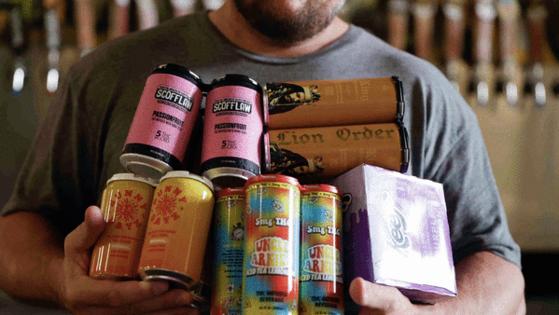Georgia's hemp producers and retailers are losers in shutdown-ending deal
Published in News & Features
ATLANTA — Georgia has been trying to wrap its arms around the growing cannabis industry for several years now.
But just as the state is weighing more changes to its hemp policy, negotiations in the U.S. Senate to reopen the federal government included a provision that makes most hemp products illegal.
It’s a decision that hemp store owners, like Joe Salome of The Georgia Hemp Co., say could all but decimate their business — if nothing changes.
“We have one year to figure it out as an industry or figure out what the rest of our lives look like,” Salome said.
He hopes new legislation can help the industry move forward again, but in the meantime, he’s reviewing the leases of his five stores in event he has to close.
The legislation ending the government shutdown, which passed the House Wednesday night and was signed a few hours later by President Donald Trump, limits products to 0.4 milligram of THC per package — effectively a ban.
There are more than 4,100 licensed hemp businesses in Georgia, including farmers, manufacturers, processors, retailers and wholesalers.
Diana Eberlein, chair of the Washington, D.C.-based Coalition for Adult Beverage Alternatives, said the federal agreement will drive consumers to a black market with less-safe products.
“Unfortunately, a ban at the federal level will eliminate the good actors, and create an illicit market that is full of untested products regulators and legislators are trying to eliminate through sensible regulation at the state-level,” she said.
The federal law includes a one-year implementation window, which Eberlein and other hemp advocates see as a runway to influence change. During the next 365 days, Georgia can operate under the state’s current regulations.
However, if there isn’t new legislation implemented during that time, the federal ban will supersede the Georgia’s regulations, making them irrelevant, she said.
Hemp is derived from the cannabis sativa plant, as is marijuana. The substance naturally contains just 0.3% of the psychoactive compound Delta-9 THC, but chemical processes can make hemp more intoxicating.
In the 2018 Farm Bill, Congress legalized hemp farming and distribution. Manufacturers since have converted non-intoxicating cannabinoids, like CBD, into stronger forms like Delta-8 THC that can give users a high. This form can be found in vapes and edibles.
Nationwide, the drinks have become a popular alternative to alcohol, and Georgia is aiming to keep up with the emerging industry.
State Rep. Mark Newton, a Republican from Augusta, is chairing a study committee to review medical marijuana and hemp policy in the state. He said he understands the Senate’s intent to remove an “unintended result of the 2018 Farm Bill.”
“The evidence that the Blue-Ribbon Cannabis Study Committee has been reviewing does indeed appear to show that, in particular, retail hemp-based THC gummies and vapes raise significant health risks to individuals. Poor quality control with varied additives, markedly variable dose levels, and numerous contaminants have caused serious concern,” he said.
In the study committee’s first meeting, the state Department of Agriculture reported that 46% of hemp distributors are not compliant with Georgia’s regulations.
In 2024, members of the General Assembly passed Georgia’s Hemp Farming Act, which allows beverage companies to produce and sell THC- and CBD-infused beverages in the state. Then, earlier this year, state lawmakers sought to limit hemp-based products to 0.3% total THC content and ban all beverages containing THC. Both measures passed the Senate but await action in the House.
There is a 10 milligram cap on THC in products, as overseen by the state Department of Agriculture.
Georgia also instituted age limits on hemp products, including beverages, passing a law last year that restricts sales to consumers over 21. Other regulations of hemp products require product testing, and smokable products are banned.
U.S. Sen. Rand Paul, R-Ky., decried the inclusion in the federal agreement on the Senate floor, calling it prohibition that will hurt farmers across the country.
“This is the most thoughtless, ignorant proposal to an industry that I’ve seen in a long, long time,” he said.
“The numbers put forward in this bill will eliminate 100% of the hemp products in our country. That amounts to an effective ban because the limit is so low because the products intended to manage pain or anxiety will lose their effect,” he added.
An Atlanta Journal-Constitution poll found that the majority of Georgians say marijuana should be made legal for recreational use, as it is in 24 other states, but full legalization of marijuana is unlikely.
Even the politics of supporting hemp production can be tricky. It’s largely seen as an economic opportunity for many Georgia farmers, but any form of drug use is uncomfortable for many conservatives.
State Rep. Ruwa Romman of Duluth, a Democratic candidate for governor, is one of the few lawmakers openly blasting the federal decision.
“Instead of fixing the skyrocketing health care premiums Georgians were just hit with, Congress snuck in provisions to hurt local businesses while pocketing money for themselves,” she said. “They’re ruining livelihoods and preventing patients from accessing alternatives to addictive opioids.”
©2025 The Atlanta Journal-Constitution. Visit at ajc.com. Distributed by Tribune Content Agency, LLC.







Comments